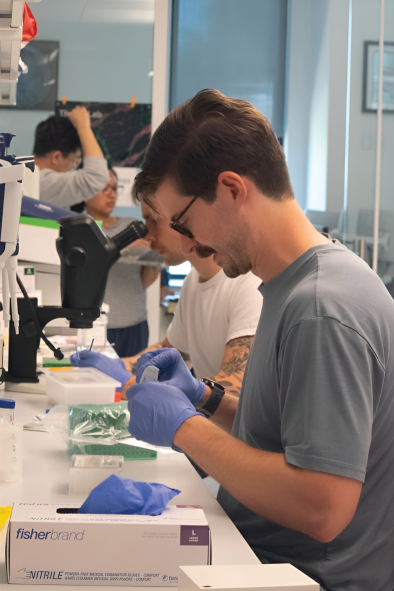
Under the cool, luminous lab light, researcher Matthew Carter pipettes substances into test tubes, gives a gentle flick to make sure the mixture is perfectly stirred, then carefully puts it back on the tube rack. Though simply a small tube, its findings will change the lives of many.
Carter is one of many researchers at the Arc Institute but only one of 11 who work is currently investigating the microbiomes of triathletes.
Located in the heart of Silicon Valley’s tech hub, the Arc Institute is a nonprofit providing individual scientists with grants to pursue high-impact, high-risk research in interdisciplinary science fields, typically focusing on complex diseases.
Amid cuts to government-funded research programs, Arc is maintaining itself as a resource for scientists across the Bay Area to kickstart new research projects. As opposed to the traditional granting strategy of funding a single project, Arc supports researchers individually and allows them to pursue whichever inquiries interest them.
“We really focus on funding the individual, rather than funding a specific project,” Academic Affairs Manager Tina Solvik said. “Whether that is a core investigator who is based at Arc or it’s a faculty member at UC Berkeley who’s getting a $1 million grant from Arc for five years, we’re funding them based on their innovative ideas for the future, but not a specific project they want to pursue.”
Founded in 2021 by Silvana Konermann, Patrick Hsu, and Patrick Collison, this relatively new non-profit has had a high impact on the local research community as well as the world of biomedical research. The unique way of funding individual researchers has attracted many more funders.
“Arc has privately fundraised over $650 million,” Solvik said. “And we’re continuing to fundraise for future years, and that enables us to fund what we call high-impact, high-reward, very creative research.”
Arc project grants are funded by the individual investors who are interested in the researcher’s field of study, allowing them to be free from recent federal grant cuts. These donations give Arc another critical advantage, the ability to give out grants quickly. In fact, grants can be given to individual researchers in 48 hours, according to Solvik, who added that the fast grant is something the founders have worked on in the past few years, as a direct result of COVID-19.
In 2021, Arc Institute started as Fast Grants, a small scale grant provider that ensured COVID19 research could be performed quickly without having to go through arduous government pathways.
“They [researchers] were able to really turn around and start projects on COVID quickly,” Solvik said. “They [Arc Institute] funded around 250 different projects and $50 million worth of research on COVID.”
Aside from the grants that support individual researchers, Arc is also known for its cross-disciplinary research.
“The most impactful science is going to be cross-disciplinary,” Solvik said. “That kind of research is going to be more and more high impact and requires expertise across fields that no one person could have alone. … Connecting machine learning scientists with epigeneticists and chemical biologists and immunologists is really important to science and is really fundamental in how Arc is modeled.”
In connecting these scientists, the Arc Institute not only impacts many people, but also becomes a stepping stone in global health discoveries. They do so by allowing researchers to quickly get into labs and make findings.
“That’s the beauty of scientific discovery,” said Xujun Cao, an Arc Institute PhD student working on therapeutics for a rare autoimmune disease that only affects an extremely small number of people.
“Whether the disease you start with affects six people or six million, you can still make a significant impact in the discoveries you make, and in the work you put forward,” Cao said.
